2013年深圳市中考英语备考之宾语从句
图片预览
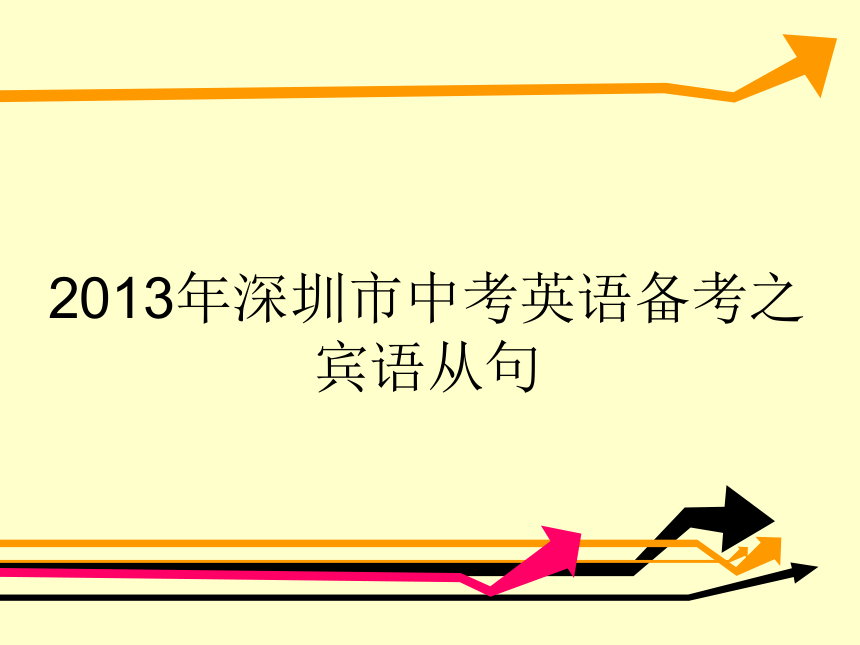
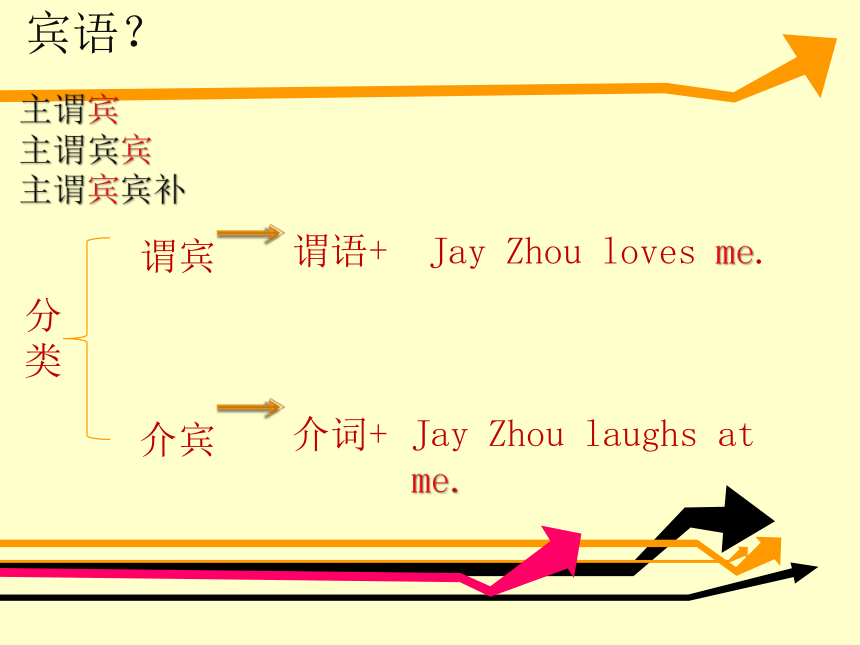
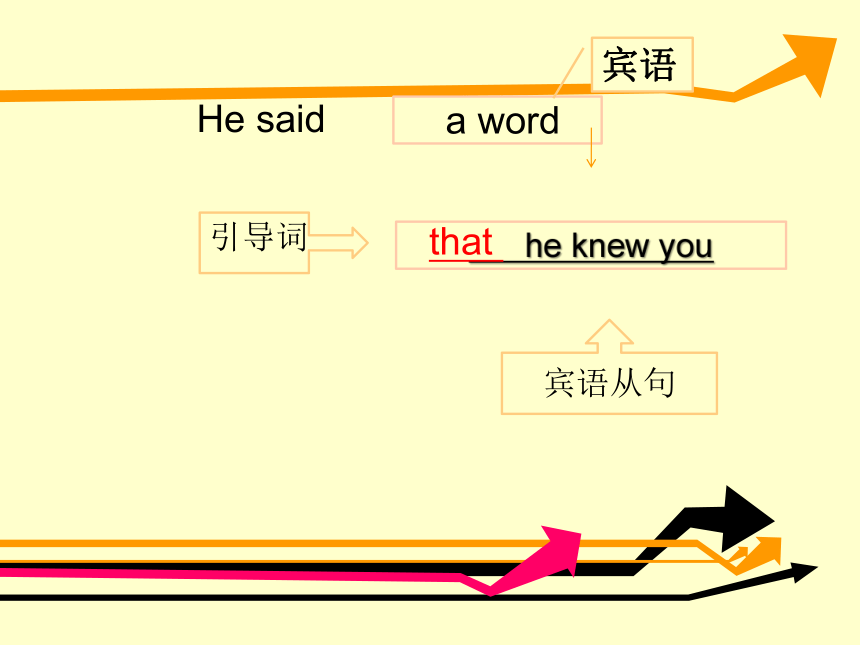

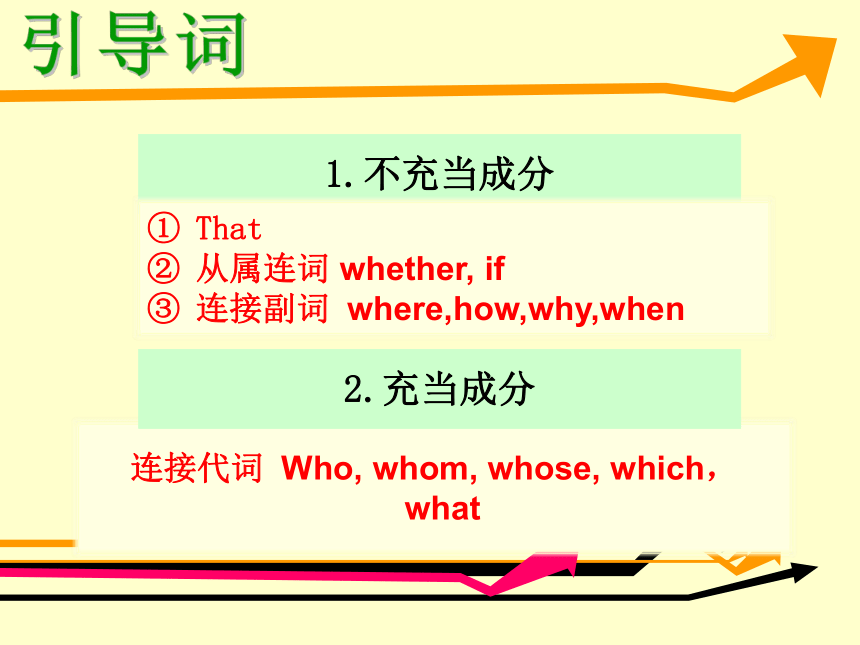
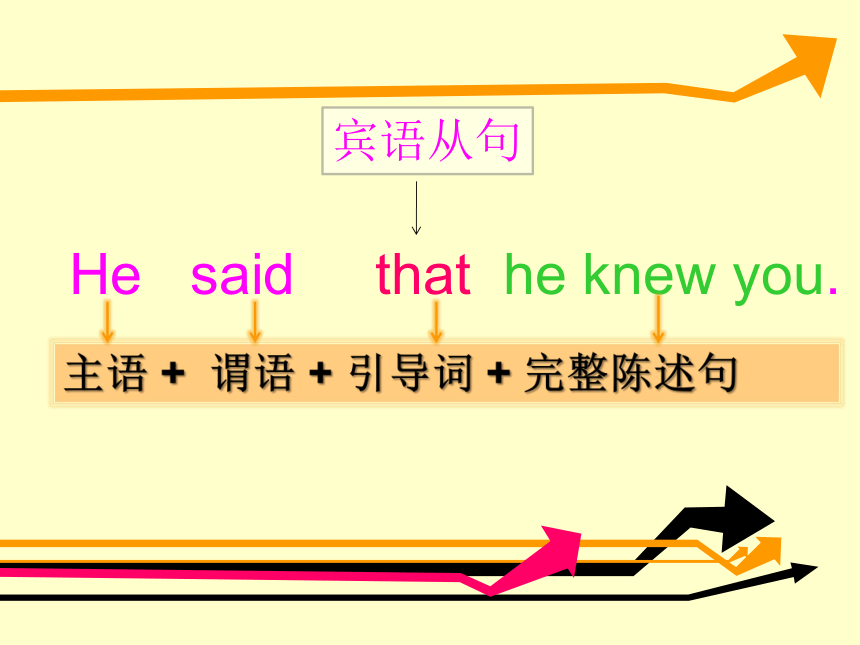
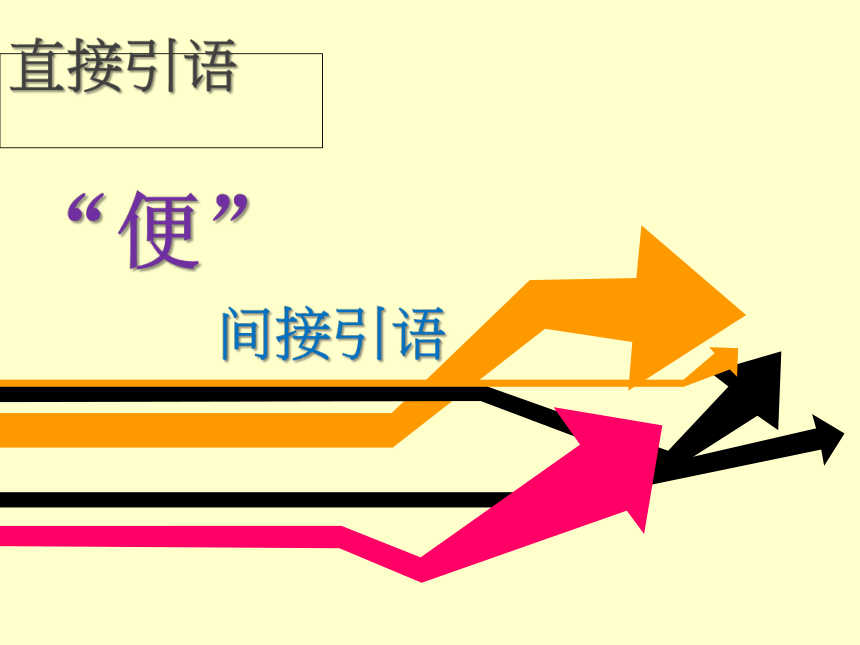
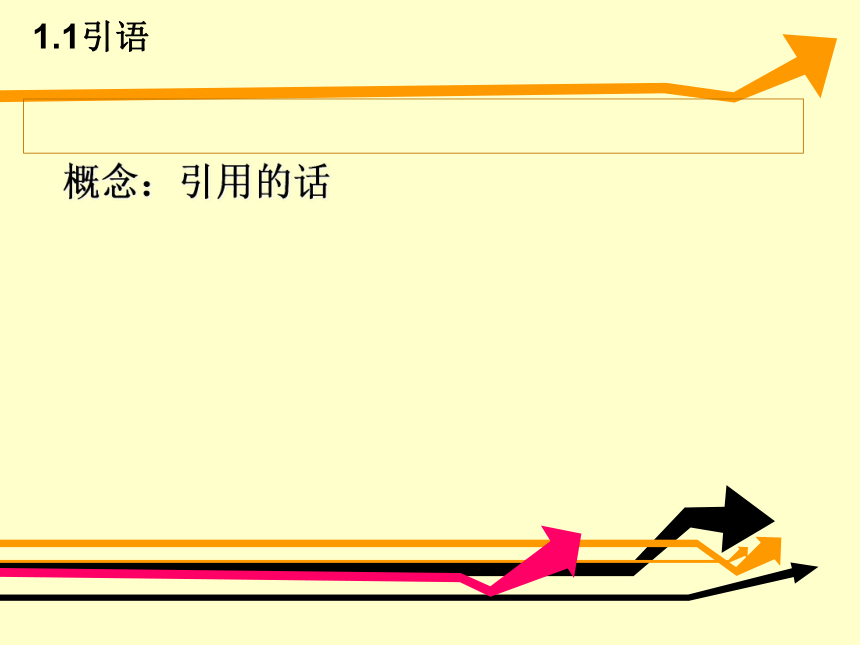

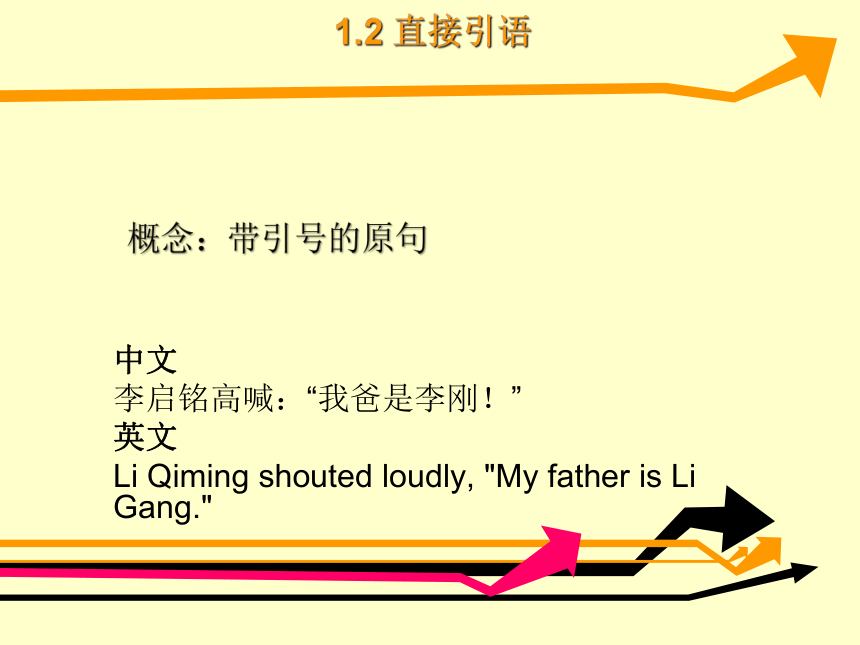
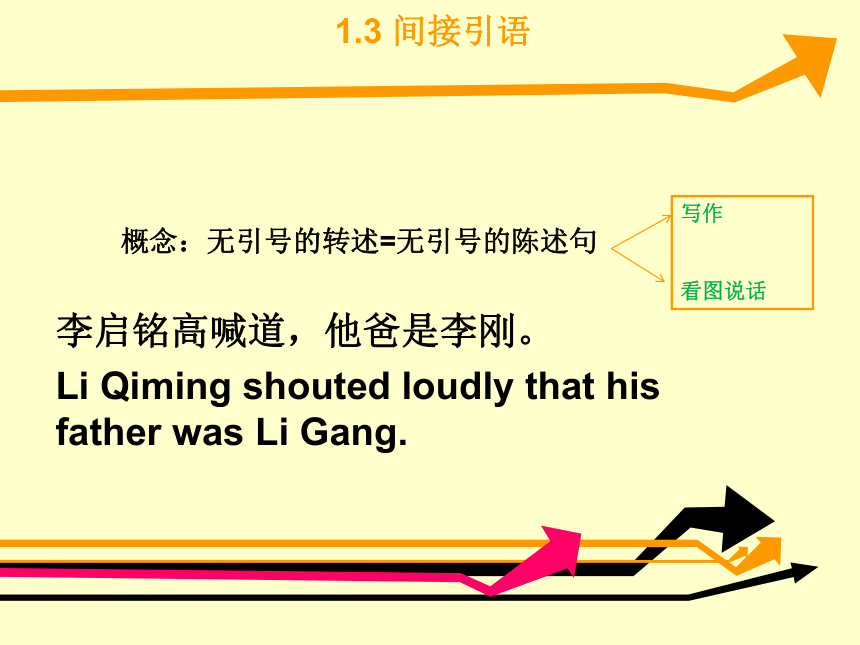
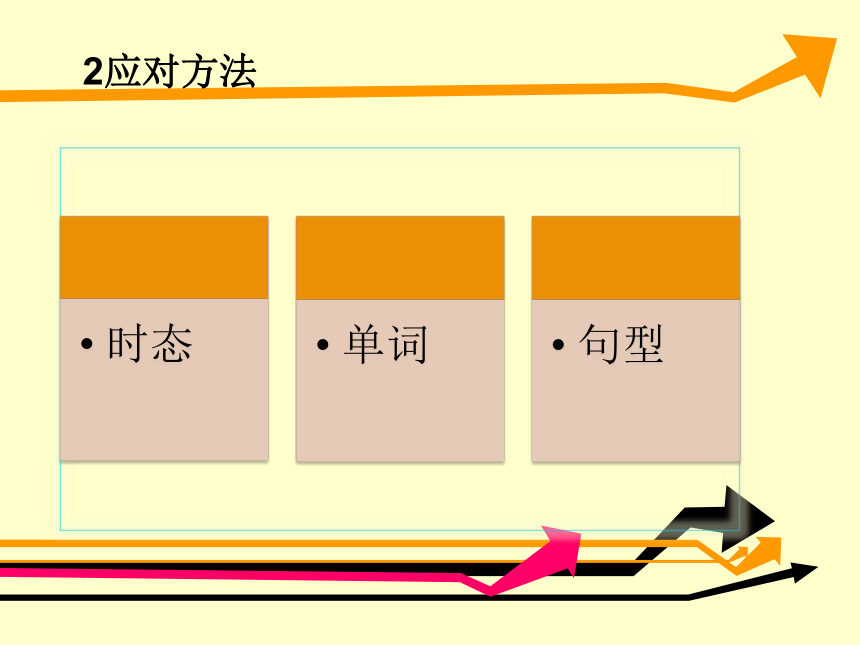
文档简介
课件48张PPT。2013年深圳市中考英语备考之
宾语从句宾语?主谓宾
主谓宾宾
主谓宾宾补分
类谓宾
介宾谓语+
介词+Jay Zhou loves me.Jay Zhou laughs at me.He said a word he knew you宾语从句 that 引导词 宾语完整陈述句在全句中作宾语。宾语从句引导词1.不充当成分连接代词 Who, whom, whose, which,
what That
从属连词 whether, if
连接副词 where,how,why,when2.充当成分宾语从句主语 + 谓语 + 引导词 + 完整陈述句He said that he knew you.直接引语 “便”间接引语1.1引语 概念:引用的话
“我爸是李刚!”1.2 直接引语
中文
李启铭高喊:“我爸是李刚!”
英文
Li Qiming shouted loudly, "My father is Li Gang."
概念:带引号的原句
1.3 间接引语
李启铭高喊道,他爸是李刚。
Li Qiming shouted loudly that his father was Li Gang.
概念:无引号的转述=无引号的陈述句
写作
看图说话2应对方法 2.1时态2.1.1一个原则
2.1.2特殊情况
2.1.3小结
2.1.1一个原则 1)She said,“I have lost a pen.”→She said she had lost a pen.“倒推"原则
2)She said, "We hope so."→
3) She said, “He will go to see his friend。”→She said they hoped so.She said he would go to see his friend.2.1.2特殊情况-时态不变 1)直接引语是客观真理。
“The earth moves around the sun and the moon moves around the earth”, the teacher told me. →The teacher told me the earth moves around the sun and the moon moves around the earth。2)直接引语是与过去有关的时态。
Jack said. "John, where were you going when I met you in the street?"→Jack asked John where he was going when he met him in the street。尤其是有过去时间限制
Xiao Wang said. "I was born on April 2l, 1980。"→Xiao Wang said he was born on April 20, 1980。3)直接引语是一般现在时,表示一种反复出现或习惯性的动作
He said, "I get up at six every morning。" →He said he gets up at six every morning。
4)情态动词must, need, had better以及情态动词的过去式could, might, should, would不变
→Peter said I had better go there that day。Peter said. "You had better come have today。"5)如果直接引语中含有 since, when , while引导的从句时态不动
He said to me, "I have taught English since he came here ."
→He told me that he had taught English since he came here.
2.1.3小结 变:过过原则
时态往前推一步,过完不变
不变:特殊情况(口诀)
惯理进行不要变,过去变过完
2.2 单词
2.2.1时间词
2.2.2代词
2.2.3地点词
2.2.4动词
一个原则:相对原则
2.2.1时间词now --- then
today--- that day
this week(month ) ----that week (month )
yesterday ----the day before
last week(month) --- the week(monthbefore
three days(a year)ago---three days(a
tomorrow ----the next (following ) day
next week(month)--the next(following)week(month)
now --- then
today--- that day
this week(month ) ----that week (month )
yesterday ----the day before
last week(month) --- the week(month) before
three days(a year)ago---three days(a year)before
tomorrow ----the next (following ) day
next week(month)--the next/following week
2.2.2代词人称代词
指示代词2.2.2.1人称代词 还原口诀-“一随主。二随宾,第三人称不更新”
She said, "My brother wants to go with me. "→She said her brother wanted to go with her.
He said to Kate, "How is your sister now?"→He asked Kate how her sister was then。
Mr Smith said, "Jack is a good worker。"→Mr Smith said Jack was a good worker。
2.2.2.2指示代词 this ---that
these--- thoseShe said. "This is mine. "→She said that was hers.they said. "These are theirs. "→She said those were theirs.2.2.3地点词
here --there
this place----that place
2.2.4动词bring -- take
come --go
2.3句型 直引为
2.3.1陈述句
2.3.2疑问句
2.3.3祈使句
2.3.4感叹句
2.3.1直引为 陈述句间引为:that引导的宾语从句
Li Qiming shouted loudly, "My father is Li Gang."
Li Qiming shouted loudly that his father was Li Gang."
2.3.2直引为 疑问句 特殊问句
He asked, "how old are you?"
He asked how old you were .
反意疑问句、选择疑问句
We asked,"has Li Qiming's conscience been eaten by dog ? “
We asked if Li Qiming's conscience had been eaten by dog .
2.3.3 直引为祈使句 间引为:
1)"tell(ask, order, beg,等)sb. (not) to do "句型,
2)let's变为主语+suggest ,insist + doing等
We called on ,“Let‘s value(重视) humanity."
We called on to value humanity.“
Let’s value humanity.
We suggested valuing humanity.2.3.4 直引为 感叹句 间接引语为what 或how 引导,也可以用that 引导。
We sigh with emotion, "how sick Li Qiming make people ."
We sighed with emotion that Li Qiming made people sick."
2.4 小结-三变 2.4.1时态
2.4.2单词
2.4.3句型
2.4.1时态 变:一个原则-倒推原则(时态往前推一步,过完不变)
不变:特殊情况(口诀)
习惯真理过进行,过去时限情态动,since,when,while引导从,切忌从句不要动
2.4.2单词 一个原则-相对原则(找对立面)
A 时间词
B 代词
人称代词-“一随主。二随宾,第三人称不更新”
指示代词
C 地点词
D 动词
2.4.3句型 一个宗旨:变“陈述语气”
口诀:
陈述that宾从
疑问疑代或疑副,还可whether或if
祈使doing或to do
感叹what, that ,how,2.5练习1). “I never eat meat.” he said.
He said that ____ never ______ meat.
2). “I’ve found my wallet.” he said to me.
He ______ me that he ______ ______ ______ wallet.
3). “I took it home with me.” she said.
She said that ______ ______ _______ it home with her.
4). The teacher said, “The sun rises in the east and goes down in the west.”
The teacher said that the sun ______ in the east and ______ down in the west.
5). “I met her yesterday.” he said to me.
He ______ me that he ______ met the day ______.
heate toldhad found hisshehadtakenrisesgoes toldbefore hadthat引导(在非正式场合that可
以省略)常用V有:Say , think , believe , wish , hope , agree
See , hear , feel , wonder , afraid ,know… The letter says (that) they are arriving on Sunday.Let’s suppose (that) one day this happens to you.1)信上说,他们将在 星期天到达。2)让我们假设,有一天这事发生在你身上。动词 think ,believe, suppose 的否定形式1) 我认为你是不对的I don’t think you are right.2)我们相信他还没有做完他的工作We didn’t believe he had finished his work一般疑问句变为if (whether)引导e.g.
She said, “ Do you often come here to read newspaper? ”
“Will they go to visit the Great Wall?” he asked.
She asked if (whether) I often came here to read newspaper. He asked if (whether) they would go visit the Great Wall. whether,if 引导 1)不知您是否愿意帮助我学习英语。2)我想知道是否他明年要参军3)他问我是否是我打碎了他的杯子I wonder if you can help me with my English .I wonder if/whether he will join the army next year.He asked me if I broke his glass.4)他不确定他是否有时间。He’s not sure whether/if he’ll have time.a)在带to的不定式前1)我们决定是否要步行去那儿。2)他们正在谈论是否要参加这个会议。We decided whether to walk there. They are discussing whether to take part in the meeting.b)在介词的后面I’m thinking of whether we should go to see the film.1)我正在考虑是否应该去看电影。c)在discuss动词后面的宾语从句时我们讨论下周是否举行运动会。We discussed whether we had a sports meeting
next week.d)直接与or not连用时We must leave whether it will be fine or not.1)无论天气晴否,我们必须离开。总结:to do/介词/ discuss /or not只用whether!!!连词whether, if 引导e.g.
1. I want to know __________________________________.
(他是否跟我们一起去公园)
2. Ask him _____________________. (他是否能来)
3. I don’t know ___________________________.(是否要下雨) if (whether) he will go to the park with us whether (if) he can come whether it is going to rain or note.g.
1. He asked, “Where do you live?”
2. “How can we get to the post-office?” he asked.
He asked where I lived. He asked how they could get to the post-office. 连接代词who, whom, whose, which, what及连接
副词 when, where, how, why引导1. He asked __________________________. (谁能回答这个问题)
2. Do you know_________________________?(他们在等谁)
3. He asked __________________________________.
(谁的书法是班上最好的)
4. Please tell me _______________________. (我们什么时候开会)
5. Can you tell me _______________. (他在哪儿)
6. Could you tell me ______________________?(我该怎么去车站)
7. Would you tell me _________________? who could answer the question whom they are waiting for whose handwriting was the best in the class when we’ll have a meeting where he is how I can get to the station why the train is late3.2 应对方法-“一宗两则三口诀?” 3.2.1一宗
(句型)一个宗旨:变“陈述语气”
3.2.2两则:
(时态)倒推原则(时态往前推一步,过完不变)
(单词)相对原则(对立面)
3.2.3两口诀:
(时态不变)习惯真理过进行,过去时限情态动,since,when,while引导从,切忌从句不要动 。
(人称变化)一随主,二随宾,第三人称不更新。
(直引句型变化)陈述that宾从疑问疑代或疑副,还可whether或if,祈使doing或to do,感叹how,that , what。
主谓宾宾
主谓宾宾补分
类谓宾
介宾谓语+
介词+Jay Zhou loves me.Jay Zhou laughs at me.He said a word he knew you宾语从句 that 引导词 宾语完整陈述句在全句中作宾语。宾语从句引导词1.不充当成分连接代词 Who, whom, whose, which,
what That
从属连词 whether, if
连接副词 where,how,why,when2.充当成分宾语从句主语 + 谓语 + 引导词 + 完整陈述句He said that he knew you.直接引语 “便”间接引语1.1引语 概念:引用的话
“我爸是李刚!”1.2 直接引语
中文
李启铭高喊:“我爸是李刚!”
英文
Li Qiming shouted loudly, "My father is Li Gang."
概念:带引号的原句
1.3 间接引语
李启铭高喊道,他爸是李刚。
Li Qiming shouted loudly that his father was Li Gang.
概念:无引号的转述=无引号的陈述句
写作
看图说话2应对方法 2.1时态2.1.1一个原则
2.1.2特殊情况
2.1.3小结
2.1.1一个原则 1)She said,“I have lost a pen.”→She said she had lost a pen.“倒推"原则
2)She said, "We hope so."→
3) She said, “He will go to see his friend。”→She said they hoped so.She said he would go to see his friend.2.1.2特殊情况-时态不变 1)直接引语是客观真理。
“The earth moves around the sun and the moon moves around the earth”, the teacher told me. →The teacher told me the earth moves around the sun and the moon moves around the earth。2)直接引语是与过去有关的时态。
Jack said. "John, where were you going when I met you in the street?"→Jack asked John where he was going when he met him in the street。尤其是有过去时间限制
Xiao Wang said. "I was born on April 2l, 1980。"→Xiao Wang said he was born on April 20, 1980。3)直接引语是一般现在时,表示一种反复出现或习惯性的动作
He said, "I get up at six every morning。" →He said he gets up at six every morning。
4)情态动词must, need, had better以及情态动词的过去式could, might, should, would不变
→Peter said I had better go there that day。Peter said. "You had better come have today。"5)如果直接引语中含有 since, when , while引导的从句时态不动
He said to me, "I have taught English since he came here ."
→He told me that he had taught English since he came here.
2.1.3小结 变:过过原则
时态往前推一步,过完不变
不变:特殊情况(口诀)
惯理进行不要变,过去变过完
2.2 单词
2.2.1时间词
2.2.2代词
2.2.3地点词
2.2.4动词
一个原则:相对原则
2.2.1时间词now --- then
today--- that day
this week(month ) ----that week (month )
yesterday ----the day before
last week(month) --- the week(monthbefore
three days(a year)ago---three days(a
tomorrow ----the next (following ) day
next week(month)--the next(following)week(month)
now --- then
today--- that day
this week(month ) ----that week (month )
yesterday ----the day before
last week(month) --- the week(month) before
three days(a year)ago---three days(a year)before
tomorrow ----the next (following ) day
next week(month)--the next/following week
2.2.2代词人称代词
指示代词2.2.2.1人称代词 还原口诀-“一随主。二随宾,第三人称不更新”
She said, "My brother wants to go with me. "→She said her brother wanted to go with her.
He said to Kate, "How is your sister now?"→He asked Kate how her sister was then。
Mr Smith said, "Jack is a good worker。"→Mr Smith said Jack was a good worker。
2.2.2.2指示代词 this ---that
these--- thoseShe said. "This is mine. "→She said that was hers.they said. "These are theirs. "→She said those were theirs.2.2.3地点词
here --there
this place----that place
2.2.4动词bring -- take
come --go
2.3句型 直引为
2.3.1陈述句
2.3.2疑问句
2.3.3祈使句
2.3.4感叹句
2.3.1直引为 陈述句间引为:that引导的宾语从句
Li Qiming shouted loudly, "My father is Li Gang."
Li Qiming shouted loudly that his father was Li Gang."
2.3.2直引为 疑问句 特殊问句
He asked, "how old are you?"
He asked how old you were .
反意疑问句、选择疑问句
We asked,"has Li Qiming's conscience been eaten by dog ? “
We asked if Li Qiming's conscience had been eaten by dog .
2.3.3 直引为祈使句 间引为:
1)"tell(ask, order, beg,等)sb. (not) to do "句型,
2)let's变为主语+suggest ,insist + doing等
We called on ,“Let‘s value(重视) humanity."
We called on to value humanity.“
Let’s value humanity.
We suggested valuing humanity.2.3.4 直引为 感叹句 间接引语为what 或how 引导,也可以用that 引导。
We sigh with emotion, "how sick Li Qiming make people ."
We sighed with emotion that Li Qiming made people sick."
2.4 小结-三变 2.4.1时态
2.4.2单词
2.4.3句型
2.4.1时态 变:一个原则-倒推原则(时态往前推一步,过完不变)
不变:特殊情况(口诀)
习惯真理过进行,过去时限情态动,since,when,while引导从,切忌从句不要动
2.4.2单词 一个原则-相对原则(找对立面)
A 时间词
B 代词
人称代词-“一随主。二随宾,第三人称不更新”
指示代词
C 地点词
D 动词
2.4.3句型 一个宗旨:变“陈述语气”
口诀:
陈述that宾从
疑问疑代或疑副,还可whether或if
祈使doing或to do
感叹what, that ,how,2.5练习1). “I never eat meat.” he said.
He said that ____ never ______ meat.
2). “I’ve found my wallet.” he said to me.
He ______ me that he ______ ______ ______ wallet.
3). “I took it home with me.” she said.
She said that ______ ______ _______ it home with her.
4). The teacher said, “The sun rises in the east and goes down in the west.”
The teacher said that the sun ______ in the east and ______ down in the west.
5). “I met her yesterday.” he said to me.
He ______ me that he ______ met the day ______.
heate toldhad found hisshehadtakenrisesgoes toldbefore hadthat引导(在非正式场合that可
以省略)常用V有:Say , think , believe , wish , hope , agree
See , hear , feel , wonder , afraid ,know… The letter says (that) they are arriving on Sunday.Let’s suppose (that) one day this happens to you.1)信上说,他们将在 星期天到达。2)让我们假设,有一天这事发生在你身上。动词 think ,believe, suppose 的否定形式1) 我认为你是不对的I don’t think you are right.2)我们相信他还没有做完他的工作We didn’t believe he had finished his work一般疑问句变为if (whether)引导e.g.
She said, “ Do you often come here to read newspaper? ”
“Will they go to visit the Great Wall?” he asked.
She asked if (whether) I often came here to read newspaper. He asked if (whether) they would go visit the Great Wall. whether,if 引导 1)不知您是否愿意帮助我学习英语。2)我想知道是否他明年要参军3)他问我是否是我打碎了他的杯子I wonder if you can help me with my English .I wonder if/whether he will join the army next year.He asked me if I broke his glass.4)他不确定他是否有时间。He’s not sure whether/if he’ll have time.a)在带to的不定式前1)我们决定是否要步行去那儿。2)他们正在谈论是否要参加这个会议。We decided whether to walk there. They are discussing whether to take part in the meeting.b)在介词的后面I’m thinking of whether we should go to see the film.1)我正在考虑是否应该去看电影。c)在discuss动词后面的宾语从句时我们讨论下周是否举行运动会。We discussed whether we had a sports meeting
next week.d)直接与or not连用时We must leave whether it will be fine or not.1)无论天气晴否,我们必须离开。总结:to do/介词/ discuss /or not只用whether!!!连词whether, if 引导e.g.
1. I want to know __________________________________.
(他是否跟我们一起去公园)
2. Ask him _____________________. (他是否能来)
3. I don’t know ___________________________.(是否要下雨) if (whether) he will go to the park with us whether (if) he can come whether it is going to rain or note.g.
1. He asked, “Where do you live?”
2. “How can we get to the post-office?” he asked.
He asked where I lived. He asked how they could get to the post-office. 连接代词who, whom, whose, which, what及连接
副词 when, where, how, why引导1. He asked __________________________. (谁能回答这个问题)
2. Do you know_________________________?(他们在等谁)
3. He asked __________________________________.
(谁的书法是班上最好的)
4. Please tell me _______________________. (我们什么时候开会)
5. Can you tell me _______________. (他在哪儿)
6. Could you tell me ______________________?(我该怎么去车站)
7. Would you tell me _________________? who could answer the question whom they are waiting for whose handwriting was the best in the class when we’ll have a meeting where he is how I can get to the station why the train is late3.2 应对方法-“一宗两则三口诀?” 3.2.1一宗
(句型)一个宗旨:变“陈述语气”
3.2.2两则:
(时态)倒推原则(时态往前推一步,过完不变)
(单词)相对原则(对立面)
3.2.3两口诀:
(时态不变)习惯真理过进行,过去时限情态动,since,when,while引导从,切忌从句不要动 。
(人称变化)一随主,二随宾,第三人称不更新。
(直引句型变化)陈述that宾从疑问疑代或疑副,还可whether或if,祈使doing或to do,感叹how,that , what。
同课章节目录
- 词法
- 名词
- 动词和动词短语
- 动词语态
- 动词时态
- 助动词和情态动词
- 非谓语动词
- 冠词
- 代词
- 数词和量词
- 形容词副词及其比较等级
- 介词和介词短语
- 连词和感叹词
- 构词法
- 相似、相近词比较
- 句法
- 陈述句
- 一般疑问句和否定疑问句
- 特殊疑问句及选择疑问句
- 反意疑问句
- 存在句(There be句型)
- 宾语从句
- 定语从句
- 状语从句
- 主谓一致问题
- 简单句
- 并列句
- 复合句
- 主谓一致
- 主、表语从句
- 名词性从句
- 直接引语和间接引语
- 虚拟语气
- 感叹句
- 强调句
- 倒装句
- 祈使句
- 句子的成分
- 句子的分类
- 题型专区
- 单项选择部分
- 易错题
- 完形填空
- 阅读理解
- 词汇练习
- 听说训练
- 句型转换
- 补全对话
- 短文改错
- 翻译
- 书面表达
- 任务型阅读
- 语法填空
- 其他资料
